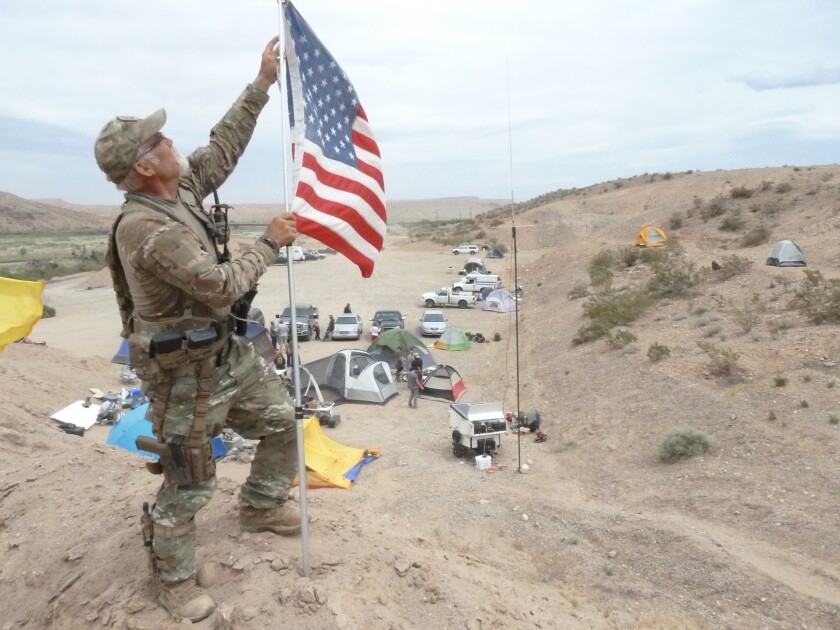
Shamelessness is their superpower, Part XXX. This New York Times piece features something I haven’t seen throughout this crisis in Portland. Right-wing concern about the federal jack-booted thugs:
Among the others concerned by the federal crackdown was Joey Gibson, a far-right activist who has long battled with Portland’s antifa demonstrators. He said he found it somewhat frightening to see video of one officer whacking a Navy veteran with a baton, and he worried that the Trump administration was setting a precedent that would encourage other presidents to embrace a more expansive use of federal forces.
“It is very concerning,” Mr. Gibson said.
You’d think he’d be more concerned about the current expansive use of federal forces but I suppose it’s better than nothing that one supposed, freedom-loving, anti-government, right winger is able to articulate a tiny bit of consistency.
I just want to remind people of some of the right wing shrieking over an earlier situation. This is from 2015:
On Saturday, a large group of armed militia members took over a federal building in rural Oregon, claiming the property to protest the conviction of two local ranchers found guilty of setting fire to government land. The protesters — many of whom openly brandish firearms — say they are “planning on staying…for years,” and have not ruled out violently defending themselves against any attempt to expel them.
Three of the group’s leaders are sons of Cliven Bundy, a Nevada rancher who was thrust into the national spotlight when he triggered an armed standoff with government forces in 2014 for refusing to remove cattle from federal land. Bundy has also reportedly been advising the Oregon ranchers, Steven and Dwight Hammond, on how to respond to the federal charges lodged against them, and many see the current occupation as a continuation of an anti-government movement Bundy started in 2014.
None of the Republican presidential candidates have weighed in on the rapidly escalating situation, which is certain to become a point of discussion in a heated 2016 election season. However, several current candidates did weigh in on Cliven Bundy’s actions in Nevada:
Rand Paul
Sen. Paul was one of the earliest endorsers of Cliven Bundy, telling Fox News in 2014, “There is a legitimate constitutional question here about whether the state should be in charge of endangered species or whether the federal government should be.”Advertisement
He rejected classifying Bundy and his gun-toting supporters as domestic terrorists, urging Sen. Harry Reid and others who used the term to “calm the rhetoric.”
Paul also personally met with the rancher for about 45 minutes during a campaign stop last June, when he two “mainly discussed federal land oversight and states’ rights, in addition to education policy,” according to Politico. One of Bundy’s sons was reportedly also present during the encounter, although it’s unclear which one.
Despite Paul’s support, however, Bundy wasn’t impressed with the senator’s support for groups such as the American Lands Council, which raises money to buy land from the federal government and return it to the states.
“I disagree with that philosophy,” Bundy said. “My stand is we are already a sovereign state. The federal government doesn’t need to turn this land back to us. It’s already state land. I don’t want to sell this land to private ownership, because I believe I already have stewardship…I don’t claim ownership. I claim rights.”
He added, “I educated Rand on that point.”
Ted Cruz
In April 2014, Cruz aligned himself with Bundy’s core complaint — government overreach — and called the standoff “the unfortunate and tragic culmination of the path that President Obama has set the federal government on.”
Ben Carson
Carson was a vocal supporter of Bundy, saying he and the militia members who stood with him were “pretty upstanding people.” He also outlined a dystopian vision for the future that closely mirrors conspiracy theories embraced by branches of the radical right.Advertisement
“But the fact of the matter is if you look back through history, what our government is doing is not unprecedented by any stretch of the imagination. It always starts like this, and freedom is not free — and there may come a time when people have to actually stand up against the government,” Carson said. “I hope that doesn’t happen.”
While appearing on Sean Hannity’s Fox News show in April 2014, Trump expressed sympathy for Bundy, saying, “I like him, I like his spirit, his spunk and the people that are so loyal…I respect him.”
Trump stopped short of uniformly endorsing Bundy’s resistance to the government, however, noting, “You do have laws in the country and you know, if everybody did what he’s doing, where does it all go?” Instead, Trump saw the protest as an opportunity for the rancher to “cut a deal” with the government.
“He’s in a great position to cut a great deal and I think that’s what he should do,” he said.
Meanwhile, Bundy himself is a Trump supporter.
Mike Huckabee
Huckabee addressed the Bundy standoff while speaking at the conservative Freedom Summit in April 2014. He insisted that he didn’t want address Bundy’s specific grievances about land usage, explaining, “I’m not here to jump in to the middle of whether Cliven Bundy ought to pay the state or pay anybody for the chance for his cows to eat some grass.”
But Huckabee did criticize the federal government taking action to enforce the law.
“There is something wrong when a government believes that some blades of grass that a cow is eating is so…an egregious affront to the government of the United States that we would literally put a gun in a citizen’s face and threaten to shoot him over it,” Huckabee said, drawing applause from the crowd.
I don’t recall any of the feds rolling up in military gear and kidnapping the Bundys but maybe I’m wrong about that.
By the way, Donald Trump pardoned Bundy.






